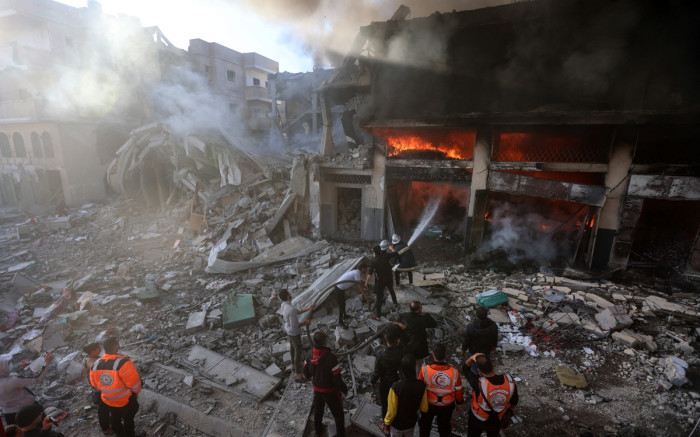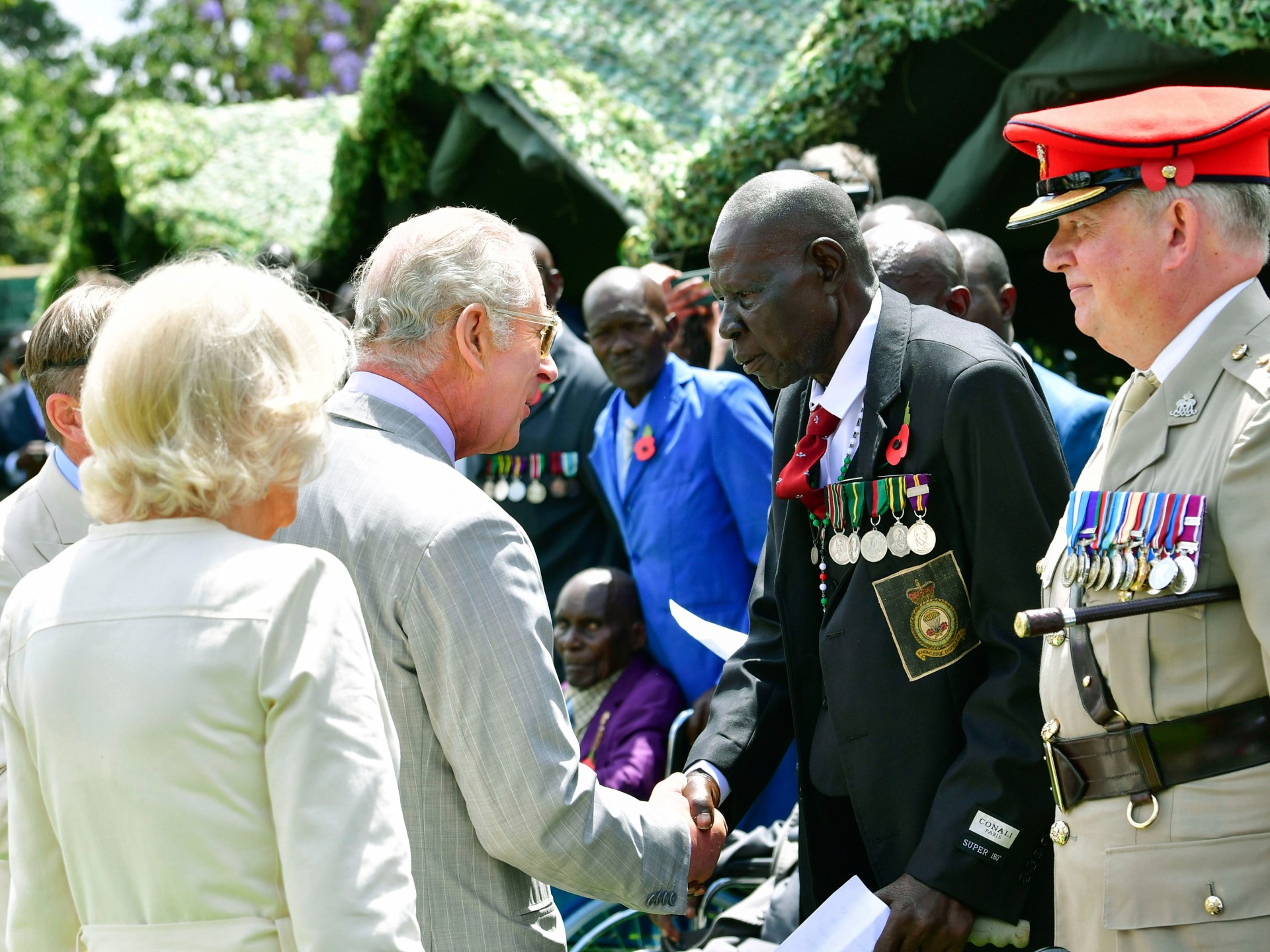
Aid groups have sounded the alarm over the “apocalyptic” humanitarian situation in the Palestinian territory, warning that the area is on the verge of being overwhelmed by disease and hunger.
Firefighters battle flames at a building hit by an Israeli attack in Khan Yunis, southern Gaza Strip, on December 9, 2023. Image: AFP
GAZA CITY – Israeli forces advanced into southern Gaza on Sunday, where hundreds of thousands of civilians have fled in search of shelter from bombardment and fierce fighting with Hamas militants.
Aid groups have sounded the alarm over the “apocalyptic” humanitarian situation in the Palestinian territory, warning that the area is on the verge of being overwhelmed by disease and hunger.
Hamas, which rules the Gaza Strip, said on Sunday that Israel had launched a series of “very violent raids” against the southern town of Khan Yunis and the road from there to Rafah, near the border with Egypt.
A source close to Hamas and Palestinian Islamic Jihad militants told AFP that both groups were involved in “fierce clashes” with Israeli forces near Khan Yunis on Sunday. An AFP journalist reported strikes in the area.
At least 17,700 people, mostly women and children, have died in two months of fighting in the narrow strip of territory, according to the latest figures from Gaza’s Hamas-run health ministry.
Israel has vowed to eradicate Hamas following the group’s unprecedented attacks on October 7, when its fighters breached Gaza’s militarized border, killing about 1,200 people and taking hostages, according to Israeli officials.
Israel said on Saturday that 137 prisoners remained in Palestinian territory.
With few options for safety, people across the Gaza Strip sought refuge in hospitals on Saturday.
In northern Gaza City, an AFP journalist said thousands were seeking refuge at Al-Shifa hospital, which no longer functions and was partially destroyed after an Israeli raid last month.
Hundreds of makeshift tents made from scraps of fabric and plastic filled the hospital’s courtyards and garden amid collapsed walls.
Suheil Abu Dalfa, 56, from the Shejaiya district, said he fled heavy bombardment by Israeli planes and tanks.
“It was crazy. A shell hit the house and injured my 20-year-old son,” he told AFP.
“We fled to the old town, everything was just strikes and destruction… we didn’t know where to go,” he said.
“We don’t know if they will storm the hospital again.”
In central Gaza, Hamas health authorities said on Saturday that 71 bodies had arrived at the Al-Aqsa Martyrs Hospital in Deir al-Balah within 24 hours.
And in the south of the territory, 62 bodies arrived at Nasser Hospital in Khan Yunis, health authorities said.
An AFP correspondent at the hospital saw a child on a makeshift stretcher and others waiting on the ground for care while firefighters outside tried to put out a burning building that had been hit by an Israeli attack.
The situation is “not just a catastrophe, it is apocalyptic,” said Bushra Khalidi of Oxfam.
“DEATH SENTENCE FOR CHILDREN”
An estimated 1.9 million of Gaza’s 2.4 million people have been displaced.
Prevented from leaving the narrow area, they turned Rafah, near the crossroads with Egypt, into a huge camp.
The United Nations Children’s Fund said on Saturday that nearly a million children had been forcibly displaced by the conflict.
As fighting intensifies in southern Gaza, where Israel had previously urged civilians to seek shelter, children are running out of safe places to go.
“They are now being pushed further south into tiny, overcrowded areas without water, food or shelter, putting them at increased risk of respiratory infections and water-borne diseases,” UNICEF’s Adele Khodr said.
“The restrictions and challenges imposed on the delivery of life-saving assistance into and across the Gaza Strip are another death sentence for children.”
As concerns grew over the worsening humanitarian situation in the Gaza Strip, Israeli army chief Herzi Halevi urged his forces to “take tougher action” in their campaign.
“We are seeing more and more terrorists being killed, more and more terrorists being wounded, and in the last few days we are seeing terrorists surrendering – this is a sign that their network is falling apart,” he said at a ceremony in Jerusalem.
National security adviser Tzachi Hanegbi told Israeli television that 7,000 “terrorists” had been killed, without specifying the source of that number.
In Tel Aviv, some Israelis held a peace demonstration.
Hundreds of others gathered at the so-called Hostage Square, demanding action to rescue prisoners held by Hamas, holding signs with messages such as “They trust us to get them out of hell.”
The Israeli army says it lost 93 soldiers in the campaign and two others were injured in a failed attempt to free hostages on Thursday evening.
Hamas said the operation killed one hostage, 25-year-old Sahar Baruch, which was later confirmed by his kibbutz community in Beeri, one of the worst-hit kibbutz communities on October 7.
A power stroke
A rare U.N. Security Council vote on a ceasefire in the conflict was rejected on Friday by the United States, whose envoy Robert Wood said the proposal was “detached from reality” and would leave Hamas in power in Gaza.
Iran, which supports Hamas, warned of an “uncontrollable explosion of the situation in the region” after the veto.
In Yemen, Iran-backed Houthi rebels threatened on Saturday to attack all ships heading to Israeli ports unless food and medicine were allowed to enter the Gaza Strip.
The French military said on Sunday that one of its frigates in the Red Sea shot down two drones that were heading towards the ship from the coast of Yemen.
Regular exchanges between Israel and the Iranian-backed Hezbollah movement in Lebanon have further fueled fears of a larger regional conflict.
The Israeli army said on Saturday it had retaliated after unspecified “takeoffs” from Lebanon, including with fighter jets.
A United Nations peacekeeping position in southern Lebanon was hit without casualties on Saturday, the U.N. force said, adding it was trying to check the source of the fire.
Violence has also increased in the Israeli-occupied West Bank, where three people were killed on Saturday, according to the Health Ministry.
The military previously said it had arrested 2,200 people in the West Bank since the start of the Israel-Hamas war, including 1,800 Hamas members.






Recent Comments